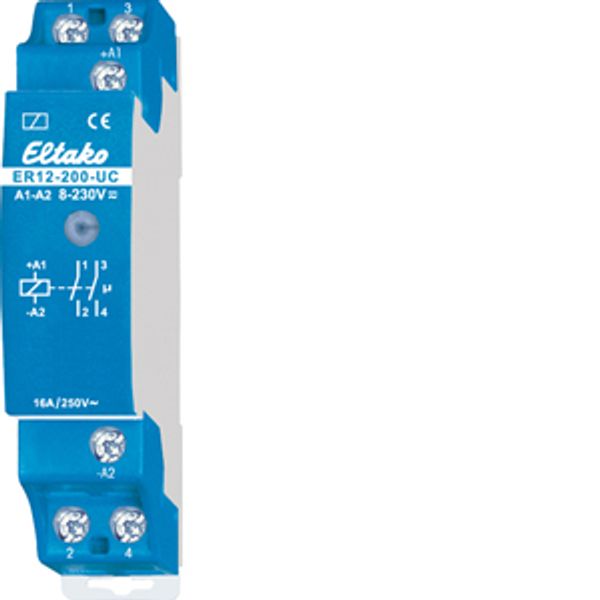Registreeru, et avada oma eksklusiivsed B2B hinnad ja alustada ostlemist. Registreeru kohe!
Switching relay, 2 NO contacts 16A
Laos: Ei
Hankija laovaru: Ei
Minimaalne tellimuse kogus: 1
Hind (ilma KM-ta):
37,09 €
EAN: 4010312205433
MPN: 22200002
Pakend: 1
Technical Information
| Toote seisukord | Uus |
| Tootja nimi | Switching relay, 2 NO contacts 16A |
| Bränd | ELTAKO |
| Kategooriad |
Releed
|
| Päritoluriik | CN |
| Harmoneeritud süsteemi kood | 8536 4900 00 |
| Paigaldusviis | DIN liist |
| Funktsioon | Osaliselt elektrooniline |
| Sisseehitussügavus | 58 mm |
| Tunnusvool | 16 A |
| Laius mooduli arvudes | 1 |
| Juhtpinge 1 | 8-230 V |
| Juhtpinge 1 liik | AC/DC |
| Juhtpinge 1 sagedus | 50 Hz |
| Toitepinge liik | AC |
| Toitepinge | 250 V |
| Suurim lülitusvool (cos phi = 0.6) | 4 A |
| Suurim hõõglampide koormus | 2000 W |
| Suurim luminofoorlampide koormus | 1000 VA |
| Suurim luminofoorlampide koormus (kaks ahelat) | 1000 VA |
| Suurim luminofoorlampide koormus (rööpkompensatsiooniga) | 500 VA |
| Normaalselt suletud kontaktide arv | 0 |
| Normaalselt avatud kontaktide arv | 2 |
| Ümberlülituskontaktide arv | 0 |
Pakendamise üksikasjad
| Pakkimistase 1 | 4010312205433, 4010312205433 |
| Pakkimistase 2 | 4010312205433 |
| Pakkimistase 3 | 4010312205433 |
Allalaadimised
Kirjeldus
2 NO contacts potential free 16A/250V AC. 230V LED lamps up to 200W, incandescent lamp load 2000W. No standby loss. Modular device for DIN-EN 60715 TH35 rail mounting. 1 module = 18mm wide, 58mm deep. State-of-the-art hybrid technology combines advantages of nonwearing electronic control with high capacity of special relays. Universal control voltage 8 to 230V UC. Very low switching noise. Contact position indicator with LED. Maximum current across both contacts 16A for 230V. Same terminal connection as electromechanical switching relay R12-200-. By using a bistable relay coil power loss and heating is avoided even in the on mode. The relay contact can be open or closed when putting into operation. It will be synchronised at first operation. This relay is not suitable to feed back the switching voltage signal of a dimmer switch. Use only relays ESR12DDX-UC, ESR12NP-230V+UC or ESR61NP-230V+UC for this purpose. The electronics does not have an internal power supply and therefore no standby loss. The microcontroller is activated when the control contact closes. This switches the bistable relay to the correct direction. The bistable relay switches back either when the control contact opens or when the control voltage falls.

